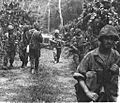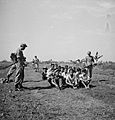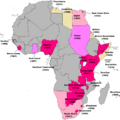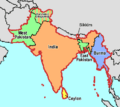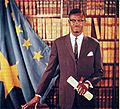Decolonization facts for kids
Decolonization is when a colony becomes independent from the country that ruled it. Think of it as a country gaining its freedom. It's the opposite of colonization, which is when one country takes control of another land and its people.
Sometimes, a colony might not become fully independent. Instead, it might join another country or even become part of the country that used to rule it. This is also a form of decolonization.
Decolonization can happen in different ways. Some countries gained their freedom through peaceful talks and agreements. Others had to fight for their independence in wars or rebellions. It's important to know that decolonization is different from old empires simply breaking apart, like the Mongol Empire or the Ottoman Empire. Decolonization usually refers to non-European lands gaining freedom from European rule.
A lot of decolonization happened in the 20th century. A big wave started after World War II. For example, India and Pakistan became independent from the British Empire in 1947. Soon after, many countries in Africa also gained their freedom from European powers.
Contents
What is Decolonization?
Decolonization is the process where a colony becomes self-governing or fully independent. It means the end of foreign rule over a territory. This often involves a shift in power from the colonizing country to the local people.
How Countries Gained Freedom
Countries gained independence in different ways. Some achieved it through peaceful negotiations. This happened when the ruling country agreed to give up control without a fight. Other times, people had to struggle and even fight wars to gain their freedom. These were often called independence movements or revolutions.
Peaceful Transitions
In some cases, the colonizing power and the colony worked together. They negotiated a plan for independence. This often involved setting up new governments and holding elections. It was a way to transfer power without violence.
Armed Struggles for Independence
Many colonies had to fight for their freedom. People formed armies and rebelled against their rulers. These fights were often long and difficult. They led to the creation of new, independent nations.
Decolonization in the 20th Century
The biggest period of decolonization happened in the 20th century. This was especially true after World War II ended in 1945. Many European countries were weakened by the war. This made it harder for them to control their distant colonies.
The End of the British Empire
The British Empire was one of the largest in history. After World War II, many of its colonies gained independence.
India and Pakistan's Independence
One of the most significant events was the independence of India and Pakistan in 1947. This marked a major step in the decolonization process. It showed that even large empires could not hold onto their colonies forever.
African Nations Gain Freedom
In the 1950s and 1960s, many countries in Africa also gained independence from Britain, France, and other European powers. This period is sometimes called the "Year of Africa" because so many nations became free.
French Colonial Empire Changes
France also had a large colonial empire. After World War II, France faced many independence movements.
Indochina and Algeria
Countries like Vietnam (part of French Indochina) fought long wars for their independence. Algeria also had a difficult war against French rule. These struggles showed the strong desire for self-rule.
Other Colonial Powers
Other European countries like Portugal and the Netherlands also had colonies. They too faced challenges from people wanting independence. For example, Indonesia gained independence from the Netherlands after a revolution.
Impact of Decolonization
Decolonization changed the world map forever. It led to the creation of many new countries. These new nations then joined international organizations like the United Nations.
New Nations and Challenges
While gaining independence was a huge step, it also brought new challenges. Many new countries had to build their own governments and economies. They also had to deal with the lasting effects of colonial rule.
Building New Societies
New leaders emerged in these independent nations. They worked to create strong, fair societies for their people. This often involved setting up schools, hospitals, and new industries.
Global Impact
Decolonization also changed global politics. It shifted power away from Europe. It gave a voice to many more countries on the world stage. This led to a more diverse and complex international community.
Images for kids
-
The Chilean Declaration of Independence on 18 February 1818
-
Prince Pedro proclaims himself Emperor of an independent Brazil on 7 September 1822
-
Russian and Bulgarian defence of Shipka Pass against Turkish troops was crucial for the independence of Bulgaria.
-
Surrender of Lord Cornwallis at Yorktown in 1781
-
Captured French soldiers from Điện Biên Phủ, escorted by Vietnamese troops, 1954
-
Manuel L. Quezón, the first president of the Commonwealth of the Philippines (from 1935 to 1944)
-
Trust Territory of the Pacific Islands in Micronesia administered by the United States from 1947 to 1986
-
U.S. troops in Korea, September 1945
-
Portuguese Army special caçadores advancing in the African jungle in the early 1960s, during the Angolan War of Independence.
-
Dutch soldiers in the East Indies during the Indonesian National Revolution, 1946
-
The UN Human Development Index (HDI) is a quantitative index of development, alternative to the classic Gross Domestic Product (GDP), which some use as a proxy to define the Third World. While the GDP only calculates economic wealth, the HDI includes life expectancy, public health and literacy as fundamental factors of a good quality of life. Countries in North America, the Southern Cone, Europe, East Asia, and Oceania generally have better standards of living than countries in Central Africa, East Africa, parts of the Caribbean, and South Asia.
-
Four nations (India, Pakistan, Dominion of Ceylon, and Union of Burma) that gained independence in 1947 and 1948
-
A Baltic exilee protest sign from the second half of the 20th century calling on U.N. to abolish Soviet colonialism in the Baltic states.
-
The Black Star Monument in Accra, built by Ghana's first president Kwame Nkrumah to commemorate the country's independence
-
Gandhi in 1947, with Lord Louis Mountbatten, Britain's last Viceroy of India, and his wife Vicereine Edwina Mountbatten.
-
Patrice Lumumba, first democratically elected Prime Minister of the Congo-Léopoldville, was murdered by Belgian-supported Katangan separatists in 1961
See also
 In Spanish: Descolonización para niños
In Spanish: Descolonización para niños


















